Massive and rapid alcoholization, very common among young people, has repercussions on the memory capacities of the brain.
-1610376092.jpg)
- 46% of 18-25 year olds have experienced at least one episode of drunkenness during the year
- Binge-drinkers are likely to experience memory problems
Alcohol and memory don’t mix. When the consumption is moderate, it does not pose a problem, but when it is excessive and fast, big problems are felt in the body, especially in the brain. Researchers from the University of Reims Champagne-Ardenne have shown that binge drinking, which consists of drinking a large quantity of alcohol in a minimum of time, has consequences on short and long-term memory. The results were published in the December 2020 edition of the monthly Behaviors Reports.
Massive and rapid alcoholization
Binge drinking consists of drinking large quantities of alcohol (the equivalent of 70g of pure ethanol) in a very short time (less than two hours). For this experiment, the researchers subjected 46 students aged 18 to 25 to a test. They were placed into two groups based on how they consumed alcohol. The first group was made up of occasional drinkers, who had engaged in one or more episodes of binge drinking in the past six months. The second, labeled as social drinkers, was made up of people who had had at most one episode of heavy drinking in the last six months.
The students were all put to a test to measure their verbal memory by memorizing a list of 24 words from different semantic categories before reciting them. In order not to harm the experience, the volunteers had to not have consumed drugs or alcohol in the 24 hours preceding the test. With three passages, they could obtain a maximum of 72 correct answers.
In the end, people who are “used” to practicing binge drinking had more difficulty remembering the words on the list than the other participants. This demonstrates that alcohol affects memory, recollections and memorization abilities. In their conclusion, the researchers point out that “binge drinking behavior affects episodic verbal memory storage and recall processes. The school failure described in occasional drinkers could be partly linked to this harmful effect.”
Effects on memory capacity
In an interview at Figaro, the neuropsychologist and author of the study Fabien Gierski goes further in his analysis. “We know that the followers of rapid drunkenness have poorer academic performance. We can assume that it is because they work less, but with this experiment we also show that their memory works less well.”
Massive alcohol consumption is a fairly recurrent phenomenon among adolescents and young adults. In a survey conducted in 2015 by the National Institute for Prevention and Health Education (Inpes), the proportion of 18-25 year olds who had experienced at least one drunkenness during the year had fallen from 33% to 46% in the space of ten years. This phenomenon, which affects both men and women, does not encourage consumers to be aware of the health risks of such a practice.
On the occasion of Dry January, it is important to remember that abstinence can be a healthy way to question one’s relationship with alcohol. The principle of this month is not to drink the slightest drop of alcohol, a decision which also makes it possible to counterbalance the excesses during the holidays. Alcohol is also not a drug to be taken lightly since according to figures from Public Health France, 23.6% of people between the ages of 18 and 75 exceeded the benchmarks for alcohol consumption (no more than two drinks a day and not every day) in 2017. Each year, alcohol is responsible for 41,000 deaths, including 30,000 in men and 11,000 in women.
.
















